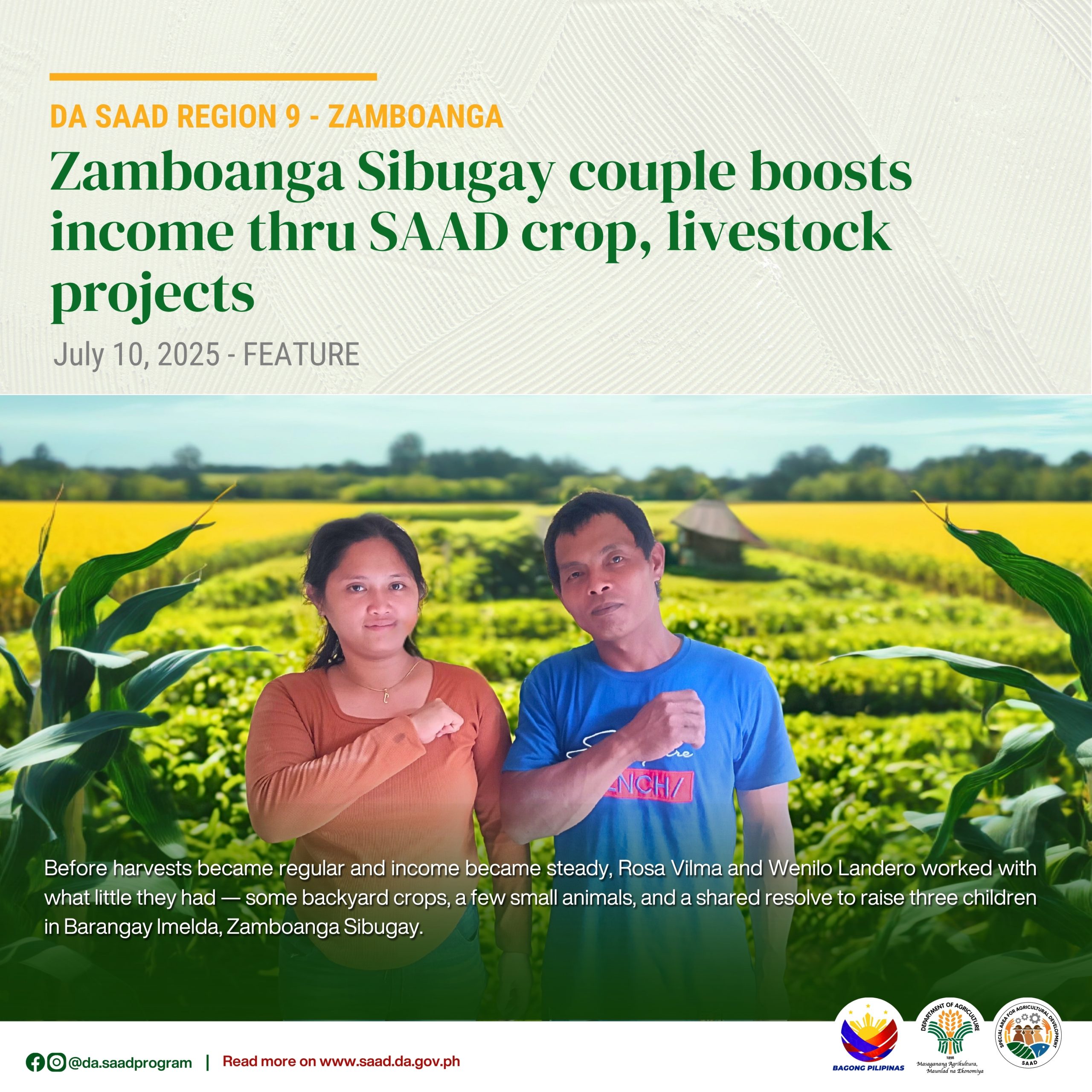Before harvests became regular and income became steady, Rosa Vilma and Wenilo Landero worked with what little they had — some backyard crops, a few small animals, and a shared resolve to raise three children in Barangay Imelda, Zamboanga Sibugay.
Wenilo, 38, had been farming for nearly two decades. Rosa Vilma, 29, had less experience but slowly learned the rhythms of planting, tending, and selling. Together, they made ends meet with Wenilo’s work at a local mining company, which earned just Php 2,000 per month.
Things began to shift in 2023, when Rosa Vilma became a member of the Israel Farmers Association. Through the Department of Agriculture – Special Area for Agricultural Development (DA-SAAD) Program Phase 2, she received three goats under the Goat Production Project. In the following year, their association was granted vegetable production support, opening new opportunities for the couple to expand beyond subsistence.
“Dako akong pasalamat sa SAAD Program kay kini gyud ang naghatag ug tinud-anay nga tabang sa amo,” said Rosa Vilma. “Dili lang kini kay gihatagan mi og kabuhayan, pero gitudluan pud mi unsaon pagpadagan ug unsaon paglambo sa among ginagmay nga tanom ug hayop.”
(I’m deeply grateful to the SAAD Program because it has given us genuine support. We weren’t only given livelihood, but also taught how to manage and grow our crops and livestock.)
In August 2024, she received a vegetable production package that included one can of squash seeds, two kilograms of sweet corn seeds, and three sacks of fertilizer. Through the association’s roll-over scheme, she contributed Php 3,000 in return.
The Landeros planted squash on a 3/4-hectare plot that same month. Three months later, they were harvesting weekly yields between 600 to 700 kilos. For two months, they sold these at the local market, earning an average of Php 6,000 per week. By the end of the season, they had netted Php 60,000.
Their success with squash encouraged them to try corn. In February 2025, they planted one kilogram of sweet corn on another 3/4-hectare plot, yielding 24 sacks—sold at Php 2,800 each — for a total income of Php 67,200. A week later, they planted another kilogram of seeds on a separate area, but the crop was affected by extreme heat and dryness, yielding only 16 sacks.
Still, they pressed on. From their earnings, they invested Php 43,000 to raise 13 piglets in December 2024. Within three months, they were able to sell the pigs by kilo, earning nearly Php 80,000. In May this year, they restocked another 13 piglets using the same amount, sustaining feed costs from their weekly vegetable sales.
“Sa una, lisod gyud kay gamay ra among kita, pero karon, makapalit na mi og panginahanglanon sa among mga anak. Nakapalit pa gani mi og bag-ong TV, unya nakatigom pud mi sa bangko,” Rosa Vilma shared.
(Before, it was really difficult because our income was so small. But now, we’re able to provide for our children’s needs. We even bought a new TV and saved money in the bank.)
Today, the couple rents and cultivates a total of two hectares, practicing crop rotation and diversification. On May 28, they planted a fresh batch of sweet corn alongside cucumber, eggplant, and okra — optimistic for another strong harvest this July.
Beyond personal gains, Rosa Vilma recognizes the broader value of being part of a farmers’ association supported by the government.
“Kung kami ra mag-isa, lisod gyud molambo,” she said. “Pero tungod kay naa ang SAAD nga mutabang sa grupo, daghan na mi nga sama nako nga nakatilaw og kalambuan. Ang pagtinabangay sa asosasyon ug sa gobyerno mao ang nakahatag og kusog sa amoa.”
(If we were on our own, it would be very difficult to succeed. But because SAAD is there to support our group, many of us—people like me—have experienced progress. The cooperation between the association and the government is what gives us strength.)
Their journey is not just a story of livelihood support. It’s about using the opportunity to build something lasting, for their family, and for the community they hope to uplift, one harvest at a time. ###
